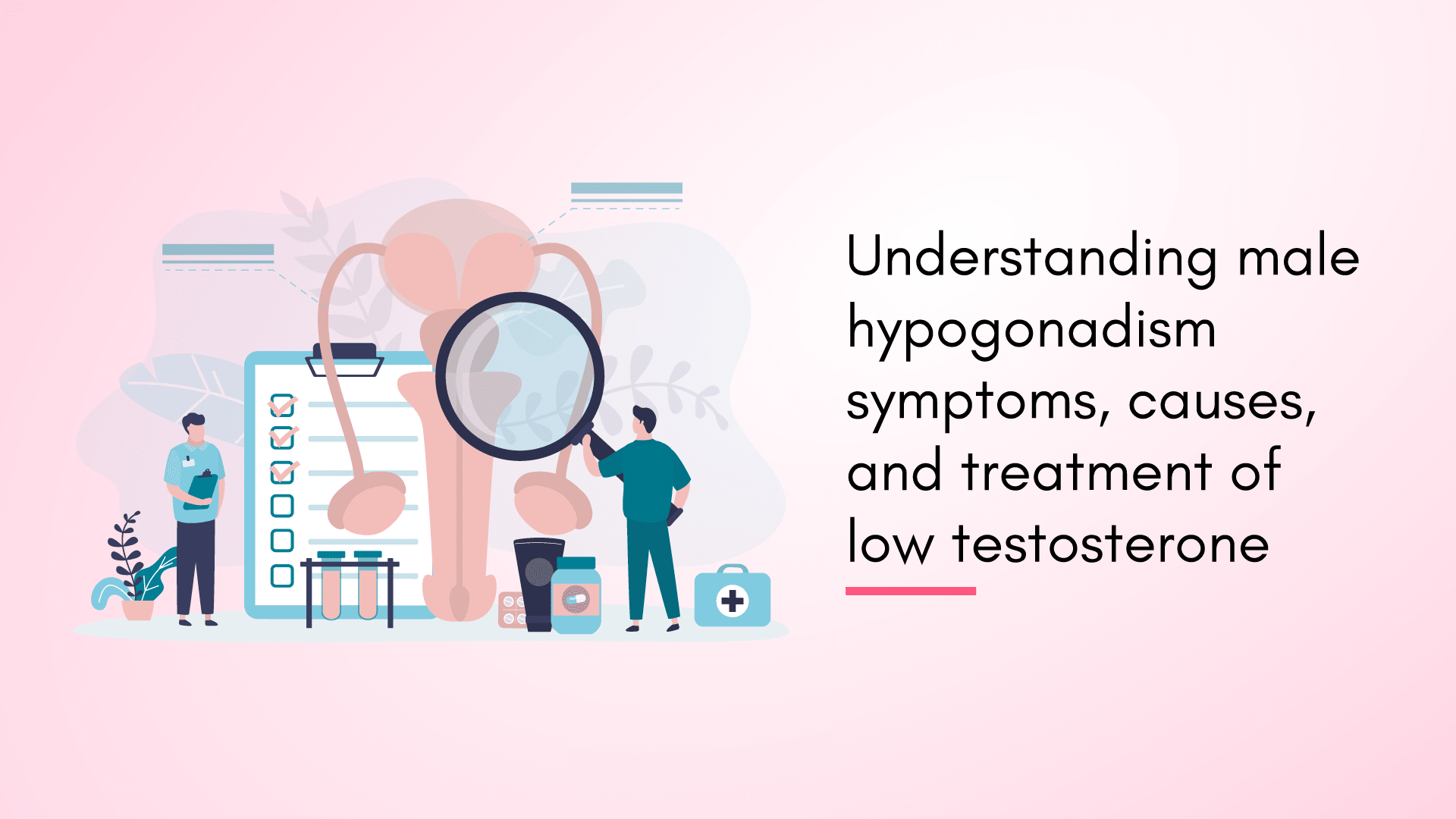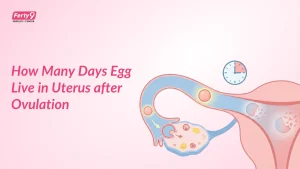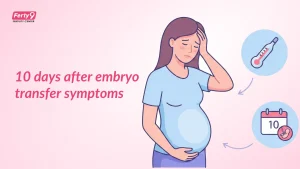Are you experiencing persaistent challenges in achieving fatherhood despite repeated attempts at conception? This recurring difficulty in starting or expanding your family may be indicative of underlying reproductive health issues that warrant professional evaluation.
Male hypogonadism, a condition where your body produces insufficient testosterone, could be the reason. While low testosterone symptoms in men can lead to infertility, the good news is that effective treatments are available.
This article covers all you need to know about male hypogonadism and its treatment options.
Struggling with male fertility? Get expert help and explore our tailored solutions now!
What is Male Hypogonadism?
Male hypogonadism occurs when the testicles do not produce sufficient testosterone, a hormone essential for growth and sperm production. This condition can lead to infertility and various other health issues.
Also read: Surprising Causes of Low Testosterone Levels
Symptoms of Low Testosterone
Recognizing the signs of low testosterone is crucial for early diagnosis and treatment. Here are some common symptoms to watch for:
- Lack of beard growth
- Reduced muscle mass
- Erectile dysfunction
- Reduced sex drive
- Depression
- Obesity and fatigue
Related read: How to increase sperm count and motility
Causes of Male Hypogonadism
Male hypogonadism has two primary types: primary and secondary, each with distinct underlying reasons.
Primary Hypogonadism:
Primary hypogonadism occurs when the testicles cannot produce sufficient testosterone due to conditions like undescended testicles, Klinefelter syndrome, or acquired issues such as testicular injury, mumps orchitis, chemotherapy, or hemochromatosis.
Secondary Hypogonadism:
Secondary hypogonadism results from issues with the hypothalamus or pituitary gland, which signals the testicles to produce testosterone. Causes include Kallmann syndrome, hypopituitarism, inflammatory diseases, HIV/AIDS, obesity, poorly managed diabetes, and certain medications.
Lifestyle Factors:
Several lifestyle factors can also affect testosterone production in the body. These include obesity and Type 2 diabetes, which are often linked to poor eating habits, lack of exercise, and alcohol consumption. Smoking also reduces testosterone levels in your body.
Age-Related Decline:
Hypogonadism is closely related to aging. While the impact of age on testosterone production greatly varies, an overall decline in testosterone levels is commonly observed as men age.
Diagnosis of Male Hypogonadism
In addition to recognizing symptoms, a laboratory examination can help diagnose the condition. Serum and sperm count tests can help in checking testosterone levels in the body, following which men can opt for fertility treatments to treat hypogonadism.
Related read: How does Work-Life Balance Impact Fertility?
Treatment Options for Low Testosterone
Some of the primary hypogonadism treatment options include:
- Testosterone skin gels: Testosterone skin gels help the body to absorb testosterone through the skin. Once you apply the gel, the body absorbs it into the bloodstream and reaches normal levels. This is one of the most commonly used treatments for male hypogonadism.
- Intramuscular testosterone injections: Testosterone injections are yet another common way of treating low testosterone levels in men. These are generally injected every two weeks, which helps boost the testosterone levels.
- Testosterone patches: Testosterone patches are part of the androgen group of hormones that can help your body restore normal testosterone levels. They should be applied to the thighs, back, or abdomen and replaced every 24 hours.
- Testosterone pellets: Testosterone pellets are small doses of testosterone that are inserted under your skin by a healthcare professional. This primary hypogonadism treatment helps your body increase testosterone levels and thereby manage testicular hypogonadism.
- Oral testosterone: Oral testosterone treatments involve the use of pills, such as testosterone undecanoate, which are particularly useful for managing low testosterone levels in men with certain conditions like Klinefelter syndrome or other forms of hypogonadism.
Lifestyle Modifications
Causes of male hypogonadism include lifestyle disorders, apart from medical conditions. Hence, certain lifestyle changes can help treat testicular hypogonadism naturally and improve your body’s testosterone in the long run. Here are some of the major lifestyle changes that you must include to avoid low testosterone levels:
- Have a balanced diet: Eating a well-rounded diet is key to feeling your best and keeping your testosterone in check. Focus on including foods rich in key nutrients that support hormone health, such as zinc, vitamin D, and healthy fats.
- Avoid alcohol and tobacco consumption: Both alcohol and tobacco have several adverse impacts on your body, including cell damage, and are one of the major causes of male hypogonadism.
- Maintain a healthy sleep schedule: Do you think sleeping late can only affect your gut health? While that is true, sleeping late and having an irregular sleep cycle can lead to several other conditions and is one of the major causes of hypogonadism in males.
- Control your weight: Obesity is one of the most pertinent lifestyle issues faced by individuals in the 21st century. Apart from causing various chronic diseases like diabetes, it can also cause low testosterone in males.
- Reduce stress: Stress can lead to several chronic health issues and is one of the major causes of male hypogonadism. High stress levels increase your body’s cortisol secretion, and prolonged episodes of stress can, in turn, reduce your body’s hormone secretion and metabolism, affecting different organs.
- Take vitamins and supplements: You can take vitamins and other supplements to keep your nutrient levels balanced, but make sure you take them under medical supervision.
Testosterone Replacement Therapy (TRT):
Testosterone Replacement Therapy is one of the primary hypogonadism treatment options for males with hypogonadism symptoms. It is also known as Androgen Replacement Therapy. This male hypogonadism treatment involves evaluating testosterone levels through blood tests and is generally administered to individuals with a testosterone level below 300 ng/dl.
TRT can help improve sexual function by treating erectile dysfunction by increasing testosterone levels. The therapy can be administered in several forms: injectable, transdermal (including patches and gels), testosterone pellets, and intranasal applications, allowing for flexibility in treatment based on individual needs and preferences.
Medications and Supplements:
One of the primary hypogonadism treatment options includes taking medications or supplements. Fluoxymesterone is a common drug that helps cure low testosterone symptoms in men. However, these drugs must be taken under the supervision of your doctor after assessing your testosterone levels.
Surgical Options
Surgical options are also effective in treating testicular hypogonadism. While oral medications are mostly advised to treat hypogonadism, your doctor might ask you to take implantable pellets if the former fails to boost your testosterone levels. These pellets are implanted inside your skin by making an incision every 3 months.
Managing Underlying Conditions:
While there are several ways to treat hypogonadism in males, one must consider a few underlying conditions before opting for them. Consulting with your healthcare professional and evaluating your testosterone levels are crucial first steps before deciding on a suitable treatment.
Additionally, disclosing previous medical health conditions, maintaining a healthy lifestyle, and avoiding substances that can harm hormone levels are some important factors to consider.
Living with Male Hypogonadism
Male hypogonadism is not just reduced testosterone levels. Instead, male low testosterone symptoms include decreased hair growth, erectile dysfunction, development of breasts, reduced muscle growth, and much more. In other words, low testosterone symptoms in males are quite visible, which can lead to several psychological impacts.
For instance, these symptoms can negatively impact their self-confidence as they struggle to accept. Hence, living with male hypogonadism can be challenging if you don’t seek help. The good part? It can be completely treated with the right therapies; all you need to do is take a step forward.
Related read: How Does Aging Affect Fertility In Men?
Conclusion
Hypogonadism leads to low testosterone levels in males, along with causing several other visible physical changes. The condition reduces one’s ability to reproduce and can also affect them psychologically. Hence, getting the right treatment by talking to your medical professional to treat the condition is imperative.
At Ferty9 Fertility Center, we dedicate ourselves to turning your aspirations into joyful realities. Our experienced team of specialists offers comprehensive care and personalized treatment plans to address hypogonadism and other fertility issues. Don’t let low testosterone levels hold you back from a fulfilling life. Contact us today to begin your journey toward better health and happiness.





























